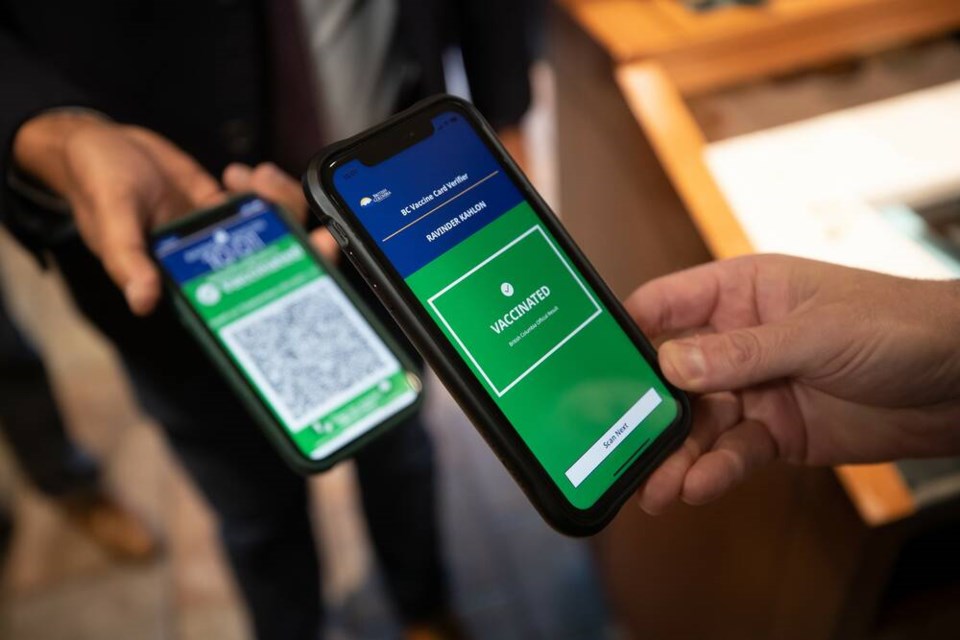British Columbians will no longer be required to show the B.C. Vaccine Card as proof of vaccination at many venues effective Friday, and seniors will soon be offered a second COVID booster shot, according to the province’s top doctor.
Provincial health officer Dr. Bonnie Henry acknowledges the end of the vaccine card will come too fast for some people and too slow for others. There’s no “magic moment” to ease pandemic restrictions, which is all about “balance,” she said Tuesday.
The elimination of the vaccine card is based on a high level of immunity — more than 91 per cent of people in the province are fully vaccinated and about half are assumed to have had COVID — and a sharp decrease in COVID cases and hospitalizations since a peak in January and February.
“Transmission, hospitalizations and deaths are all down since our last report [in mid-March] and this is encouraging,” said Henry. “Our approach has always been to only have the minimum necessary restrictions to keep our community safe.
“Now … we can progress from legally enforceable community requirements to a place of collectively managing this together.”
Some businesses have said they will still ask patrons to wear a mask or present a vaccine card, Henry said.
Ian Tostenson, president and CEO of the B.C. Restaurant and Foodservices Association, credits the vaccine card for encouraging a lot of people to get immunized, but said now that more than 90 per cent are vaccinated, asking for proof for entry to restaurants is no longer needed.
“The time has come,” Tostenson said in a phone interview Tuesday. “And that’s a tribute to everybody in British Columbia.”
Businesses will now transition to communicable disease plans from COVID-19 safety plans. A vaccine requirement for post-secondary residences will also be lifted as of April 8.
Tostenson said patrons can expect that restaurants will maintain high safety standards with respect to preventing transmission of communicable diseases. “[Just] because we’re not doing a vaccination card doesn’t mean anything will change from a health and safety point of view … those standards are still extremely high.”
The elimination of the B.C. Vaccine Card requirement does not affect the vaccine mandate for health-care workers.
Meanwhile, many people can expect to receive their invitations for second boosters in the coming weeks, says Henry. Those eligible include seniors in the community age 70 and older, those of any age in long-term care, those designated as clinically extremely vulnerable, and Indigenous people age 55 and older.
“This is going to be a really important measure for us to boost the immunity in those most vulnerable to severe illness and hospitalization as we go into the spring,” said Henry. “An extra booster dose right now will provide a rapid increase in antibodies, and we’ve seen that from data in other countries where this has been used.”
Earlier Tuesday, the National Advisory Committee on Immunization recommended provinces and territories prepare to offer second boosters to high-risk groups, including people age 80 and older and residents of long-term care homes. A second booster may be considered for people age 70-79, it said.
New COVID modelling presented Tuesday shows COVID cases and hospitalizations have decreased greatly since January and February but increased slightly in the last two weeks of March, as cases of the more transmissible BA.2 variant rise.
The increased hospitalizations have occurred mostly in those age 80 and older. In that age group, the rise has been largely among those with just two vaccinations, compared with those who had the booster shot.
People over age 80 remain at highest risk of hospitalization, severe illness and death from COVID-19, says Henry.
Hospitalizations with COVID-19 remain low for most younger people and even for most people in the 60 to 70 age group.
In a worst-case scenario — if transmission increases due to low levels of mask-wearing, the elimination of the vaccine card, or spread of the Omicron BA. 2 variant — the number of new daily hospital admissions related to COVID-19 could increase by 10 to 20 per cent.
It’s hoped that offering a second round of booster shots will help curb that rise.
B.C. Health Minister Adrian Dix noted on Monday that more than 68,000 people over age 70 had yet to receive a booster shot.
COVID is being tracked in the province via reported test results, monitoring of reports by acute care and long-term care facilities, wastewater sampling, targeted surveillance of blood samples, and genetic sequencing performed in labs on positive case samples.
The province’s daily reporting of COVID-19 numbers will switch to weekly reports starting Thursday.



